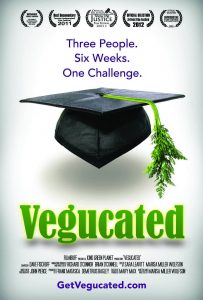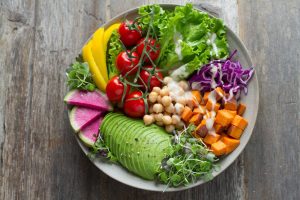A review of “Vegucated,” a documentary directed by Marisa Wolfson (2010):
Sophia Cegledy & Madison Manns
Key messages:
The key messages of this documentary were targeted at attempting to get more people to adopt a vegan, or at least vegetarian lifestyle.
- One key message that was emphasized throughout the documentary was that going vegan, although society has a relatively negative view of this lifestyle, is not as challenging as many think it is. For example, many people in America express that going vegan would be too difficult because there are not very many vegan options for food around them. However, one of this documentary’s main points was that the number of health food stores, local vegan stores, delis, and restaurants offering vegan choices is growing significantly.
- Furthermore, the documentary emphasized that eating vegan food can be just as tasteful and satisfying as eating typical American foods, which is another reason why people often opt out of the vegan lifestyle.

In this way, the documentary supported arguments for veganism, but it also showcased many arguments that were against the non-vegan, or typical American diet.
- For example, the documentary had a significant portion of its time dedicated to showing images of mistreated farm animals in large factories and farms. One detail from the documentary was how “A typical bird raised for meat… is lucky to survive the sorting process. His snood or comb is cut off, parts of his toes are cut off, and part of his beak is seared off. All without pain killers.” Detailed explanations and images such as these of what large-scale factories and farms do to chickens, cows, pigs, and other animals served as an argument against the typical American diet, saying that it was inhumane and that veganism was a more respectful option for eating.
- The final key message from the documentary was how the typical American diet increases a person’s risk of developing chronic diseases such as cardiovascular disease. In opposition to that diet, the documentary stated that adopting a vegan diet will make a person 26% less likely to develop cardiovascular disease.
Ideologies they are supporting:
- Vegans are not “crazy” and their lifestyles are not as strict or limited as what they are made out to be. In the documentary, three participants were used for a six week veganism trial, in which all the participants went completely vegan for six weeks. Afterwards, the participants in the veganism trial had almost all positive things to say about this experience at the end of the documentary, with many comments such as “I definitely think I can maintain this lifestyle,” “I feel amazing,” etc. The documentary utilizes the three very different lifestyles of the veganism trial participants to support this ideology, saying that if these people can do it and believe they can maintain it, then so can anyone.
- The treatment of farm animals in today’s food industry is inhumane. Humans do not need to eat farm animals to survive, and a strictly plant-based diet is ideal for the human body, so the consumption of any animal product is unnecessary.
- Climate change is a severe issue affecting our world and to help combat it, more people should adopt vegan or vegetarian lifestyles. The documentary supported this argument by showcasing how farm animals release more methane gas than typical transportation methods such as cars or buses, so it was argued that farm animal reproduction needs to be slowed down if we want to combat climate change with as much force as possible.

(Cohut, 2019)
Key storylines:
The documentary followed three Americans on their six-week long attempt to adopt a completely vegan lifestyle. They were asked to be vegan for six weeks to see if their veganism stuck. All three of the participants had completely different lifestyles, which the producers used to show the audience that becoming vegan can be achievable regardless of what life you live.
- One woman was a particularly picky eater who did not like vegetables and was used to having large amounts of meat at every meal. By the end of the documentary, she was fully vegetarian. The documentary utilized her as an example that even if you are already picky and are not a fan of many of the typically vegan or vegetarian foods, you can still find a way to adopt this lifestyle.
- A male participant was used to the classic American diet full of meat, cheese and potatoes. He ate those three foods every single day and could not imagine life without them, but was open to trying new experiences. By the end of the documentary, he was mostly vegan. This example was utilized to show the audience that adopting a vegan lifestyle is possible regardless of how long you have been accustomed to the American diet.
- Another woman was an extremely busy mother of two working two different jobs. She rarely had time to cook meals herself and often relied on fast food for meals. By the end of the documentary, she was fully vegan. This example was utilized to show the audience that a vegan diet can be just as simple and quick as a fast food diet, depending on how you prepare your food.
Contents/Themes from class:
- Downfalls of the American food system– A standout point made in the documentary was that if the entire world ate the way Americans did, we would need five planet earths to sustain that global lifestyle. The documentary also pointed out how the aggrandizement of farms and factories in the U.S. has caused production of animal products to go through the roof, and in the process, results in enormous amounts of food waste. For example, when fish are taken from the ocean in ginormous nets, many other types of sea life that could be used for food are just thrown away if it is not want the fishermen are looking for. We discussed in class often about the issues in the American food system and how large industry causes many health concerns within that system, and this documentary showcased many of them.
- Social perception of food ways- The documentary addressed the social perception of veganism, how typically vegans are viewed as insane environmentalists who make their own toothpaste and have to”grow out their armpit hair.” This social perception of the vegan food way is a profound example of social beliefs impacting what people eat on a daily basis. We talked in class often about how social constructs of a food may or may not increase a person’s chance of eating them. With veganism, the social construct behind it and the belief that the lifestyle is extremely strict and limiting causes many to be turned off to the idea of becoming vegan.
Informed opinion (strengths & weaknesses):
- The film made some swaying points which advocated for veganism but a lot of their argument played into the viewers emotional side. There was a montage of graphic clips from slaughterhouses with the inhumane treatment of animals which would turn anyone away from animal products. However the lasting impact of these images did not have a profound effects on the participants or me. This was a short term benefit of the film but a long term weakness.
- This documentary did a great job following the evolution of three unhealthy individuals and it is motivational to those who are looking to try being vegan. However, the main arguments of the film focused getting viewers to switch to veganism by scare tactics when it could have spent more time on the health benefits and variety of foods that vegans have.
Bagley, D. & Mataska, F.. (Producer), & Miller Wolfson, M. (Director). (2011). Vegucated [Motion
Picture]. United States; Independent.
Cohut, M. (2019). [How Can a Vegan Diet Improve Your Health?] Retrieved March 24, 2021 from https://www.medicalnewstoday.com/articles/324343.
Filmsfortheearth.com (n.d.) [Vegucated by Marisa Miller Wolfson 2010] Retrieved March 18, 2021 from https://filmsfortheearth.org/en/films/vegucated.
Sengupta, S. (2012). [Importance of Green Vegetables in our Life]. Retrieved March 24, 2021 from
https://saastastebuds.wordpress.com/2012/03/31/importance-of-green-vegetables-in-our-life/.